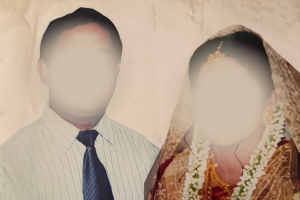Trigger warning: Mentions of suicide. This story was brought to you by Lien Foundation.
All images by Justin Tan for RICE Media unless stated otherwise.
Krystal* remembers the call she received from Mama, her 75-year-old paternal grandmother, in March 2016.
“I want to end my life, the voices are too much,” her grandmother uttered on the call. Krystal could only console her grandmother, telling her that things would be okay and that she would visit her soon.
A week later, another distressing call came—this time from the police. Mama had taken her own life at a HDB block opposite Krystal’s home.
Now a healthcare professional in her mid-30s, Krystal remembers being unable to process the grief. She was only in her mid-20s and had just started work when Mama passed.
It was just another workday when the call came. After that, everything blurred. She could only stay behind with the rest of her family as her dad went through the motions: identifying the body, liaising with the police officers, and then planning his own mother’s funeral.
The next day, the family held a small Christian service before Mama’s cremation at Mandai. They never informed any other extended family members or had any visitors. Till today, everyone believes Mama had passed peacefully from illness or old age.
Everyone bore their grief in their own way. Her sisters sat together, reminiscing about the good times with Mama. But the heaviness of a family member who died by suicide was unspoken, untouched.
Prior to Mama’s passing, the family had not realised how serious things were—if they had known that she was in that much distress, they would have taken immediate action. To the untrained or unaware individual, these warning signs often go unnoticed.
Krystal was offered three days of compassionate leave, but she only used one of them, returning to work after the first day. It was the only thing she could do to feel normal again.
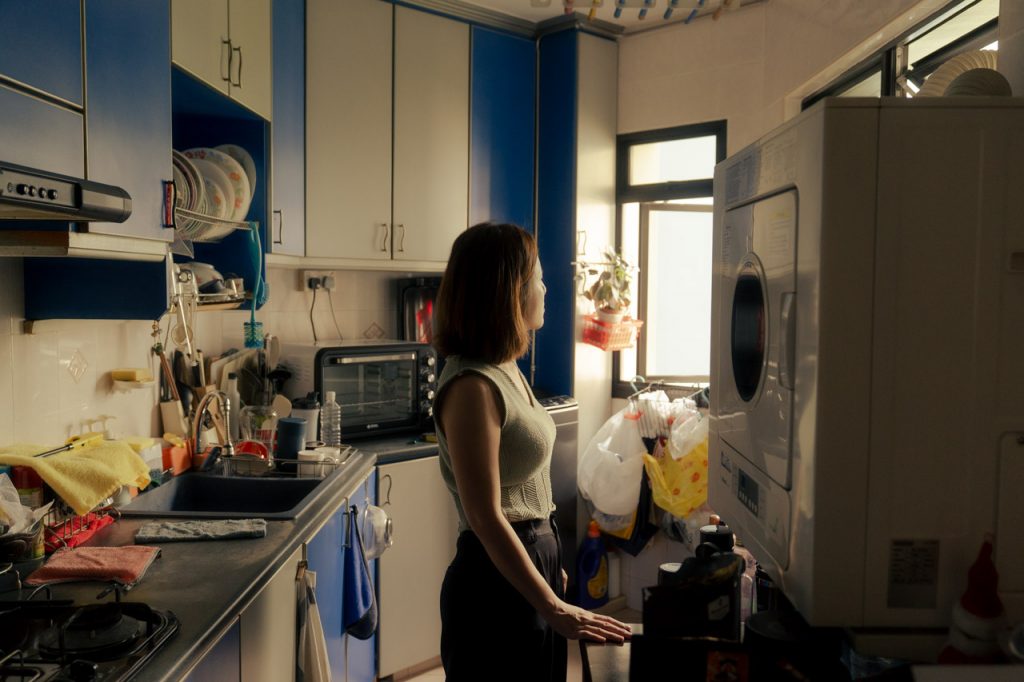
Her family did the same, slipping back into routine, each silently waiting for the “right time” to address the unspoken. It didn’t come.
Months blurred into years. Krystal, doing her best to cope, found herself breaking down more and more.
Tearing up, she recalls: “I didn’t have anyone there to help process my emotions. There were a lot of ‘Why’ questions. I didn’t know if my grief was normal.”
Suicide remains a subject Singaporeans tiptoe around, especially among loved ones. Questions like “Why didn’t I see it?” and “Could I have done more?” often lead to silence, driven by the fear of reopening deep wounds.
Krystal understands her family’s reluctance to discuss the topic. Perhaps it’s the nature of families in Asian cultural settings where we tend to avoid open expressions of emotions.
Like Krystal and her family, many silently fumble through the fog of sudden, violent loss. There has to be a better way.
The Good Times
Krystal’s grandmother had been by her side since infancy. The family lived together in a home in the east that belonged to her grandfather.

Mama was deeply affectionate and nurturing. Growing up, Krystal and her sisters were always whisked away on outings with her. Mama was their primary caretaker, pampering Krystal and her siblings while her parents were out at work.
She’d often bring them out to Genki Sushi and nag, as all grandmothers do, when she felt that they weren’t eating enough and would tell them to order more. Downtown East became a place they frequented regularly, visiting Escape Theme Park or the Hello Kitty cafe, where Mama would fondly watch them play.
But when Krystal was in Secondary 1, her family decided to move out to their own place.
It was a huge shift from seeing her grandmother pottering around the kitchen each day, lovingly calling her for meals. Still, Krystal took comfort in knowing her grandparents found solace in their own space.
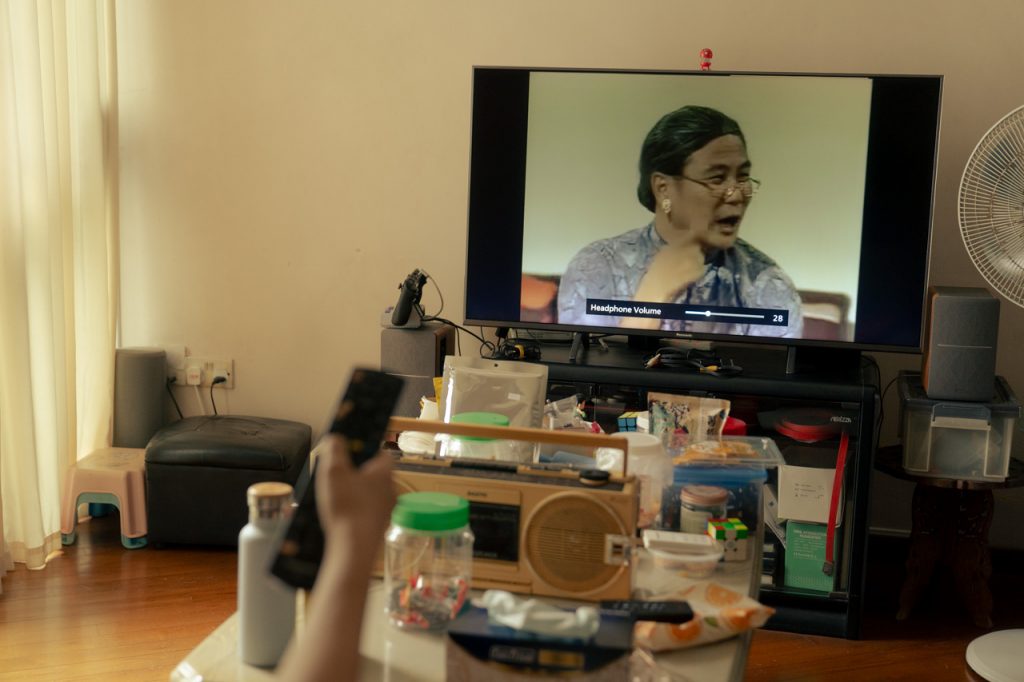
But when Krystal went overseas to further her studies, the physical distance grew into a quiet emotional drift from her grandparents.
With her parents occupied with work and the sisters increasingly busy with school, their visits gradually dwindled. What began as regular visits once or twice a week grew to occasional monthly and fortnightly drop-ins.
When Krystal was in her second year abroad at university, working on her allied health degree, her younger sister approached her, worried. She had noticed that their grandmother was acting out of character. It didn’t occur to them that it could be mental health issues.
In early 2011, Mama had begun to hear voices in her head. During their visits, she wouldn’t let the family open the windows, and they weren’t even allowed to speak loudly because “the upstairs neighbours could hear.”
She even chose to cut the main telephone line in the house. To drown out the ‘noises’, Mama would play the radio very loudly.
Though becoming increasingly worried, Krystal and her family were at a loss. They didn’t know how to manage Mama’s condition. Eventually, Krystal suggested they bring Mama to a doctor or to see a psychiatrist in 2012, even though she wasn’t keen.
So they did. Unfortunately, her condition only worsened. Turns out, the psychiatrist was prescribing her grandmother sleeping pills so that she would “sleep the noises away”. But the temporary fix only made Mama feel more agitated when she woke up the next day.
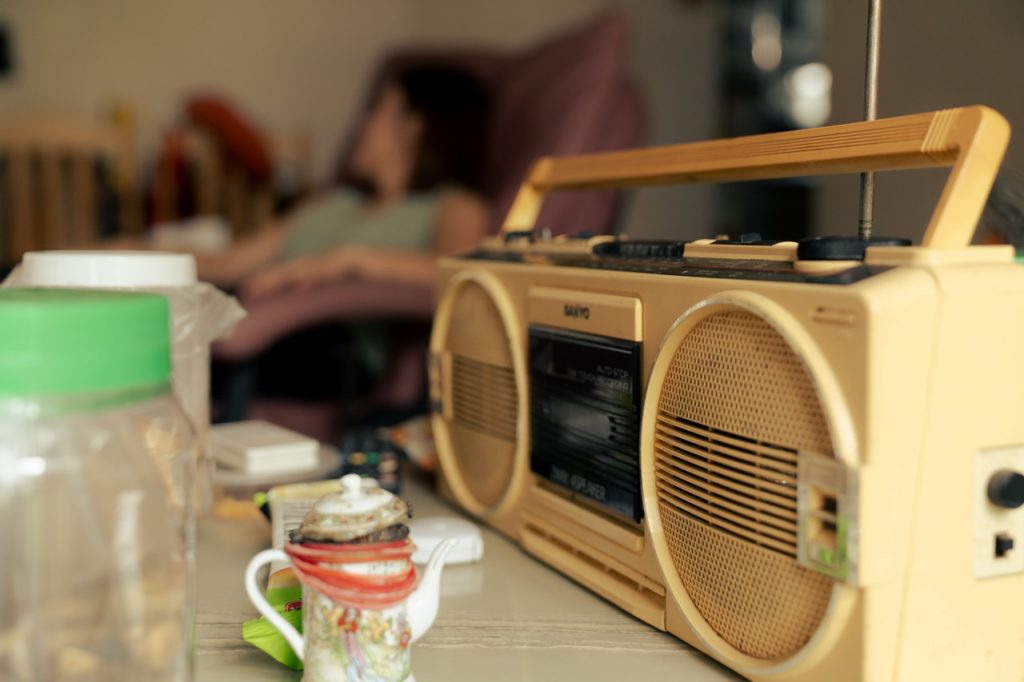
Frustrated, Krystal accompanied her grandmother to one of her appointments. Even with her basic understanding of psychology, the signs were clear: Mama was suffering from psychosis.
“I voiced my concerns, urging the psychiatrist to take her seriously. I even warned her that Mama was a suicide risk,” Krystal said, agitated. Her pleas went unheard.
Refusing to give up, Krystal tried to get social service agency Lion’s Befrienders to pay regular visits to her grandmother. But with the multiple psychiatric visits and the “noises” that had grown even more rampant in her mind, Mama became highly distrusting of people. She avoided hospital visits and vehemently refused house calls.
Krystal’s grandfather was the main caregiver, tending to his wife’s needs, but even he had begun showing early signs of dementia—high-functioning, yet slipping.
By then, the family had exhausted all their options and had nowhere to turn. Krystal’s father struggled with the reality of being unable to care for his elderly parents.
Mama, once lively and full of warmth, became consumed by despair. Her calls grew heavier, her conversations fixated on death. In her world, the voices in her head were real, relentless, and inescapable.
As the family scrambled to make sense of it all, Mama made her decision to end her life near Krystal’s family home.
The Cry For Help
Days after her grandmother’s death, Krystal could only watch on as her grandfather would look down from the corridor ledge and mutter under his breath: “This is quite high”.
His dementia had worsened, but she could see that her grandfather was trying to make sense of the loss of his wife.
So did Krystal. She tried talking to her friends, but they couldn’t relate to her, nor were they very helpful in consoling her.
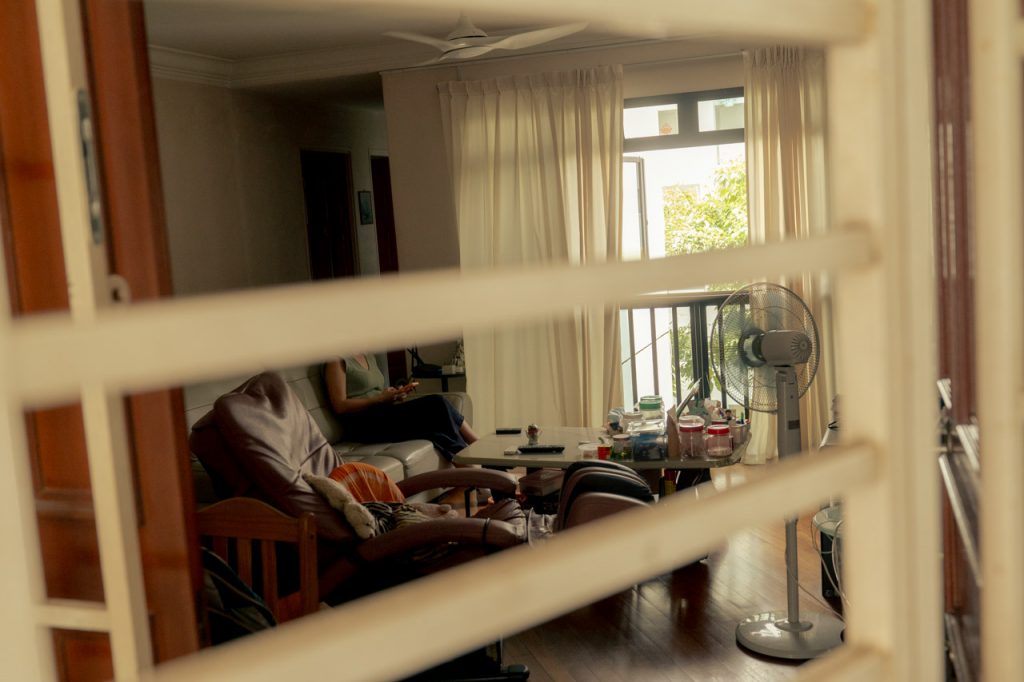
“Grandparents or parents are seen as the nurturing, wise ones, playmates to their grandchildren, and trusted advisors to their children who are now parents themselves. They also provide a sense of stability and are pillars to their family,” Chan May Peng, the Lead Counsellor at Samaritans of Singapore (SOS), explains.
“Thus, when a suicide loss happens in the family involving the grandparent, quite often we see the family’s cultural belief and values system of ‘pillar and harmony’ start to fracture.”
Lost and left without an outlet, Krystal buried herself in routine at work and home, pretending everything was fine. But the grief grew unbearable after a few years, and soon, she found herself searching for help on Facebook.
She found support groups overseas that shared their experiences and helped each other heal. Curious, she tried to find a Singapore-based support group and came across SOS.
It was then that she met Danfeng, her counsellor, who added regular one-to-one counselling to her routine. The first few sessions were excruciating. She thought she had her emotions under control, but the minute Danfeng brought up her grandmother’s death, the floodgates opened.
“If I had known about SOS earlier,” she reflects, “it would have been much easier for me to get out of the fog.”
Krystal also joined support group sessions with other survivors. While their stories and the impact they felt weren’t the same, they were still able to comfort each other.
Hearing from others on managing grief gave Krystal a sense of normalcy and validation: “However I’m feeling, however long it takes me, it’s normal.”

Throughout her journey, Krystal continued to question the whys of it all. Why did her grandmother choose to go the way she did? Why couldn’t she find a solution to help her in time?
But with time and support, she learned to accept that there would be no answers—that she had tried, and really, she had done all she could.
Strengthening Support
It’s only natural for the elderly to fall ill and go for healthcare visits, but Krystal wishes that healthcare professionals could make a proactive effort to check in with the elderly, even if they do have a partner or a caregiver.
There may be many programmes and initiatives currently in place that address suicide, such as the National Mental Health and Well-Being Strategy launched in 2023. However, senior suicide remains largely absent from public discourse.
It’s a noticeable omission, especially with Singapore’s ageing population and our expected super-aged status by 2026.
However, SOS continues to work closely with various government agencies, empowering the community through skill-based training programmes to build a wider safety net in the community to support those in distress.
“We understand that systemic change takes time, and that building a more supportive ecosystem for mental health—especially for our seniors—is a long-term effort,” SOS remarks.

Krystal knew that her grandfather—Mama’s direct caregiver—was around to look out for her. He could settle the house bills and make decisions. But he, too, was struggling with early-onset dementia. Putting his wife first, he was oblivious to his condition worsening.
While support is offered to the elderly who live alone, Krystal hopes that elderly caregivers, just like her grandfather, could be prioritised too.
“Maybe for those who live alone, they [professionals] can conduct a mental health screening of some sort? I just want to know how we can get better mental health support for the elderly who are suffering in silence,” she remarks.
Krystal has a slew of questions she wants Singapore’s healthcare system to address.
Are there ways we can intervene before it gets really bad? Do we have the resources to educate psychiatric and mental health departments to keep suicide-risk patients on their radar?
In 2022, there were 118 suicides among individuals aged 70 to 79. This number decreased to 86 in the following year. A study by the Institute of Mental Health (IMH) also pointed out that the prevalence of depression increased from 20,938 older adults in 2013 to 42,089 in 2023.
Dr Huang Wanping, a Senior Principal Psychologist at Tan Tock Seng Hospital specialising in elderly mental health, explains that she consults with seniors who suffer silently because she commonly sees seniors who are socially isolated.
“There’s a lot of loss and grief among the elderly. When not managed, it might lead to depression and a higher suicide risk,” Dr Huang explains.
“We need to do more to raise awareness that it’s not okay to be reclusive.”
She emphasises to her seniors that they’re not alone, although at times, it might seem that there’s no one they can confide in. She also doesn’t make light of suicide claims.
“If my patients openly share active suicidal thoughts, have an active plan with a date in mind, or signs that are quite imminent, we alert family members immediately. We also engage in suicide contracts—an agreement that the patient must not harm themselves till the next psychotherapy session.”
While there are several initiatives and services designed to address suicide prevention here, mental health and support, stigma surrounding suicide can still prevent individuals from seeking help. In turn, this could be the underlying cause of delayed intervention.
When more than 8 in 10 Singaporeans associate suicide with stigma, how do we expect families like Krystal’s to be ready to open up about the depth of emotions they feel from losing an elderly family member to suicide?
The sense of stigma exacerbates feelings of shame and isolation, leaving families wondering if others will view them negatively or place blame on them for the tragedy, whether or not they’ve exhausted all their options.
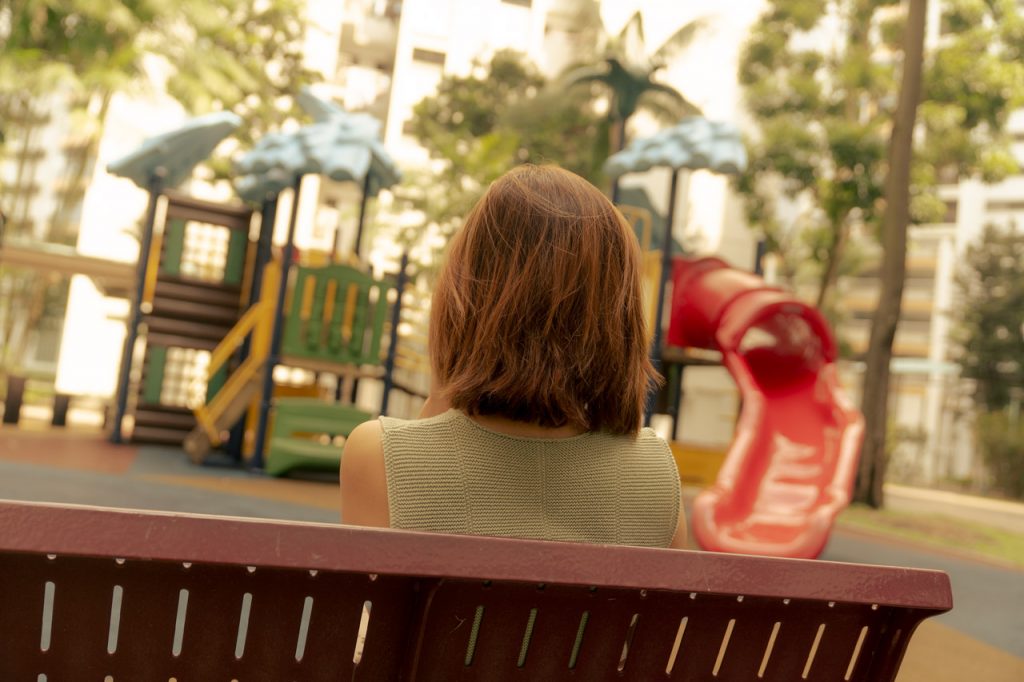
It’s Okay To Talk About Death
Krystal says she’s doing okay now. Her feeling of guilt and hopelessness about ‘not doing enough’ reduced and became manageable after attending counselling sessions at SOS.
Instead of holding herself back from moving forward from her grandmother’s passing, she opened herself up to new connections—getting married and becoming a mother.
She’s open with her partner about grappling with her sense of loss. And in addition to therapy, she now has her own family helping her move through her struggles step by step.
Krystal’s parents, siblings and relatives never did come together to talk openly about their emotions or directly address Mama’s passing. But she’s grown to accept it.
This experience has only strengthened Krystal’s belief that people “should talk more about death and what a good death means to them”.
Death shouldn’t be taboo. It should be a conversation. Talking openly about it forces families to face the uncomfortable truth—what the elderly truly want but are rarely asked.
And even when the unthinkable happens, Krystal’s biggest lesson is realising that, over time, things do heal.
“As cliche as it sounds, it will get better,” she offers.
“Take your time. People always feel like there’s a deadline when it comes to feeling ‘better’. They question why we’re still affected. But in reality, it will always stay with you. Sure, it might resurface. But it’s okay.”
Helplines in Singapore
Samaritans of Singapore (SOS) Crisis Helpline
Call: 1-767
Institute of Mental Health Helpline
Call: 6389 2222
National Care Hotline
Call: 1800 202 6868
Singapore Association of Mental Health (Toll-Free Counselling Hotline)
Call: 1800 283 7019
ec2 online counselling
Visit: www.ec2.sg
CHAT
Visit: www.chat.mentalhealth.sg
SOS provides confidential emotional support to anyone facing a crisis, thinking about or affected by suicide, with specialist counselling services, support groups and outreach programmes. Reach out to us at comms@sos.org.sg for more information.


